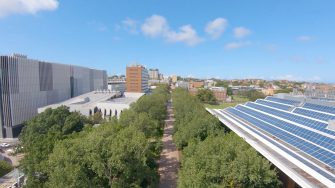
What is the societal challenge?
Globally, the shift towards producing and using renewable energy is increasing. Over the past decade the production of renewable energy has more than doubled, and its share of total primary energy consumption has grown from 9% to 13%. However, despite this growth, the use of fossil fuels is still increasing to meet energy demands.
To keep global warming to no more than 1.5°C – as per the Paris Agreement – emissions need to be reduced by 45% in 2030 and reach net zero by 2050. Governments have the biggest responsibility in the transition to net-zero emissions by mid-century, but businesses, institutions, investors, cities, communities, states and regions must also take action to support the transition.
While tackling climate change is a top priority for university education, research and innovation, university activities have a significant climate impact. Greenhouse gas (GHG) emissions from energy sources such as electricity and gas are well documented and tracked, however indirect supply value chain emissions account for the majority of emissions from large organisations. These types of emissions result from supply chains, investment activities, travel, waste and other indirect sources, and are typically outside of an organisation’s direct control. Addressing this issue requires collaboration with suppliers and partners to drive emission reductions in the wider economy.
Project leads
Andrew Dansic, Academic Lead, Humanitarian Engineering, UNSW
Moses Alicwamu, Water Program Manager, ASEI Uganda
Contact us
If you have any questions or suggestions regarding the Societal Impact Framework or the consultation process, please get in touch.
